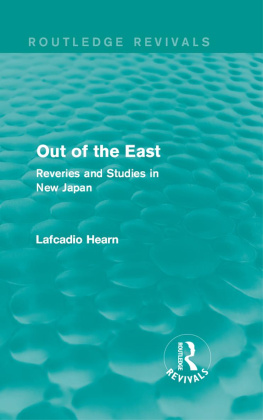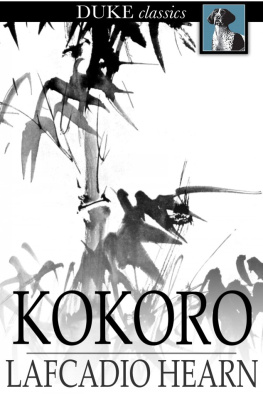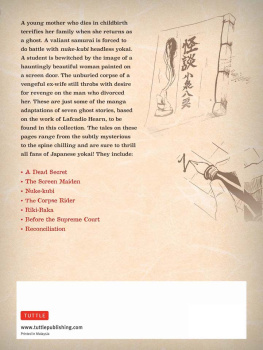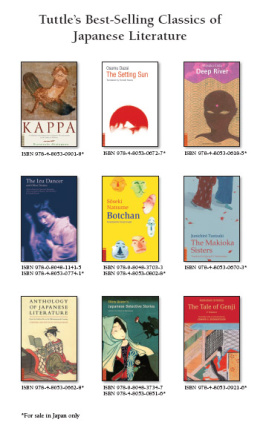First published 1992 by Japan Library Ltd.
Published 2019 by Routledge
2 Park Square, Milton Park, Abingdon, Oxon OX14 4RN
52 Vanderbilt Avenue, New York, NY 10017
Routledge is an imprint of the Taylor & Francis Group, an informa business
Louis Allen ( Introduction ) and Hirakawa Sukehiro ( Commentaries ) 1992
All rights reserved. No part of this book may be reprinted or reproduced or utilised in any form or by any electronic, mechanical, or other means, now known or hereafter invented, including photocopying and recording, or in any information storage or retrieval system, without permission in writing from the publishers.
Notice:
Product or corporate names may be trademarks or registered trademarks, and are used only for identification and explanation without intent to infringe.
British Library Cataloguing in Publication Data
A CIP catalogue entry for this book is
available from the British Library
Hearn photographs: courtesy IBM Infinity issue No.88, 1991
Set in Plantin Roman 10 on 11 point
Keywork by Jean Brann and Ann Tiltman
Typesetting by Visual Typesetting, Harrow, Middlesex
ISBN 13: 978-1-873410-02-8 (pbk)
Louis Allen
In Memoriam
Louis Allen first encountered the Japanese in Burma in mid 1945. At the age of 19 as an undergraduate reading French at Manchester University he was recruited by the Army into Intelligence and sent to London University's School of Oriental and African Studies to learn Japanese on an intensive 18-month course. His class, a group known as Translators Five, consisted of John 'Roger' Fry, Kenneth Gardner, John Hartley, Jim Follan, Stan Radcliff, Ron Beverton and David Anderson. A remarkable collection of irreverent and talented personalities, their collective story was to be told years later by Sadao Oba in his 1988 book Setichu Rondon Nihongo Gakko.
After completing the SOAS course, he was commissioned as a Lieutenant in the Intelligence Corps. His first assignment in the Far East was as a translator at the South-East Asia Translation and Interrogation Centre (SEATIC) in Delhi. However, he soon volunteered to serve close to the front line in Burma. He joined the mobile translation and interrogation section attached to the 4 Corps, Fourteenth Army and was posted to the 17th Indian Division at the Sittang.
He subsequently attained the rank of Captain and was mentioned in despatches. This distinction was earned in the summer of 1945 when, from amongst a pile of soaking battlefield Utter captured by a Gurkha patrol, he spotted a Japanese document which he believed might have considerable significance. He immediately translated it straight onto a typewriter. It was in effect the forward break-out plan of the large Japanese force trapped in the Pegu Yomas. It described in detail the routes to be taken by the fleeing Japanese army east to the Sittang River and to its regrouping with forces in Thailand and from Rangoon. Forewarned, the blocking manoeuvres of the Indian Divisions turned the planned Japanese operation into what has been called the coup de grace of the Japanese Imperial Army in Burma.
In the months immediately following the Japanese surrender in August 1945, Louis Allen was engaged as a language officer in liaison work and war crimes investigations at Payagyi Japanese Surrendered Personnel Camp near Pegu in southern Burma. During this period, he interviewed over 600 members of the Japanese forces, from generals to line soldiers. He later was to state many times that this close daily contact with the Japanese, with whom he was able to communicate with considerable fluency, enabled him to see them as human beings rather than the brutal savages of wartime propaganda.
'If you were involved in the early days of the defeat of Malaya, or if you were in Burma before ... the summer of 1944, the Japanese were a hard and ruthless enemy that you feared and took very seriously if you valued your life ... After that ... from late 1944 until the end of the war, my only feeling for the Japanese I saw was one of compassion. I felt sorry for them I didn't think they could do anything ultimately harmful at all and the notion of fear had gone completely.'
There is no doubt that this unique combination of his particular contribution to the Burma war campaign and the timing of his arrival left him free of the bitterness and hatred felt by so many among the British and Allied forces who witnessed at first hand the horrors of the worst kinds of Japanese behaviour during the war. Instead, he saw an enormous need for mutual understanding and reconciliation between the former enemies. He began as a soldier of Burma but then went on to spend much of his later life as an assiduous and often passionate student and interpreter of Japanese life and culture.
He returned to Manchester when he was demobbed to complete his French degree and then won a two-year scholarship to the Sorbonne. In 1951 he accepted a post as lecturer in French at Durham University, where he was to remain for the rest of his academic life, gaining the status of Reader in French in 1983. He was later made both Emeritus Reader in French and Honorary Fellow of the Northumbrian Universities East Asian Centre. His profound erudition was allied to his mastery of a vast array of languages and to a constant and life-affirming intellectual curiosity. It was precisely this combination of qualities that inspired and formed the subject-matter of Roy Fuller's poem 'Strange Revelations' which appeared in his anthology Consolations. His Durham base, provided by the university, was Dun Cow Cottage where he and his wife, Margaret, setded down and brought up a family of four sons and two daughters. (Great sadness was visited on the family when Margaret died prematurely in 1979 after thirty years of marriage.)
To many of his friends around the world Dun Cow Cottage came to be perceived as a sort of headquarters an oasis even for intellectual debate and exchange. For Louis Allen, almost biblical in appearance with his precipitous eyebrows and luxuriant beard and moustache, the roles of teacher and pater familias were utterly instinctive.
Soon after his arrival in Durham he began work on the series of war histories for which he is best remembered: Japan: The Years of Triumph (1971), Sittang: The Last Battle (1973), The End of the War in Asia (1976), Singapore 1941-42 (1977) and Burma: The Longest War 1941-45 (1984). These volumes were the result of extensive personal research and first-hand knowledge of the area, together with an ability to read Japanese sources fluently. His conviction that 'you cannot tell a story from one side' to get the true picture of events was the basis of his even-handed and comprehensive approach. Burma: The Longest War is widely perceived as a model for military historians in terms of its clarity and the weaving of the stories of both sides into one narrative.













